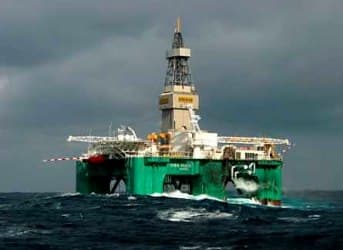While the Gulf of Mexico is one of the world’s most heavily developed offshore oil production sites, one area has remained offline up to now – Cuba’s offshore waters.
That is about to change later this year, however as according to Russian state-controlled oil company Zarubezhneft CEO Nikolai Brunich, the company in August, will start drilling in Cuba’s offshore waters.
According to Brunich, the potential oil reserves of Zarubezhneft’s Cuban offshore concession total about 200 million tons, located in waters about 1,300 feet deep.
Zarubezhneft Deputy General Director Iuri Smirnov said that the company has already done 3D seismic on its bloc L concession and expects to complete analyzing the data by next month.
In addition to bloc L, Zarubezhneft is surveying four blocs in Cuba: two onshore (9 and 12) and two (III and L) offshore. Hedging its bets Brunich said that Zarubezhneft has decided to focus only on bloc L at present and that the company has already handed back one license, while two others are in the process of being returned.
But the good news for foreign investors?
Smirnov said that Zarubezhneft would consider bringing in partners to develop the project, currently estimated to cost $6.5 billion, telling journalists, "$6.5 billion is a very operational estimate. If a deposit is discovered, an economic model will be formulated, everything will be worked out. If the costs are higher, the model could be adjusted. If a deposit is discovered, we might recruit partners, since huge investment will be required. It's not that we can't manage them, we can, but it is always better to work in a partnership. We have not studied this issue, but many seek such a partnership. This could be Cuban companies, it could be foreign partners."
Zarubezhneft estimates that full development of its bloc L concession will take about five years.
So, the question is – who might partner with Zarubezhneft? At present, not major oil companies located a mere 90 miles away, as Washington continues to maintain its now 52 year-old trade embargo against Cuba.
Cuba currently produces a paltry roughly 50,000 barrels of oil per day from onshore sources and is currently dependent on imports to cover the remainder of its indigenous use. Accordingly Havana is understandably eager to begin exploiting its offshore reserves, which estimates place between 5-20 billion barrels of crude in a 43,000 square-mile drilling area containing 59 maritime fields it has designated off its northern coast.
In the absence of any U.S. interest, Cuba is courting any and all energy suitors. Besides Zarubezhneft, Cuba has signed exploration agreements with Spain’s largest oil company. Moving quickly on its concession Repsol-YPF, which drilled Cuba’s first onshore well in 2004, on 19 January brought the massive Italian-made Scarabeo 9 semi-submersible oil rig from Singapore after the end of hurricane season into Gulf of Mexico waters north of Havana, where it will eventually drill six exploratory wells about 30 miles north of Havana and a mere 60 miles south of Key West. Repsol-YPF is leasing the Scarabeo 9 rig for about $500,000 and said it expects to begin drilling within days to find out whether the reserves are as rich as predicted. Repsol-YPF spokesman Kristian Rix said, "The geologists have done their work. If they've done it well, then we'll have a good chance of success. It's been a long process, but now we're at the point where we discover whether our geologists have got it right. It's a happy day."
Repsol-YPF and Zarubezhneft’s interest in Cuban offshore reserves should prompt some sober re-evaluation of the efficacy of five decades’ worth of U.S. sanctions against Cuba, which have signally failed to produce “regime change.” If such policies have failed after more than 50 years, they seem unlikely to succeed now and in the interim, only foreign oil companies along with Havana will profit from exploiting an energy resource a mere 60 miles off the U.S. coast.
Furthermore, the Cuban oil will have to be refined somewhere, and would prove an ideal replacement for the proposed Alberta oil sands crude, which was to be transmitted by the Keystone XL pipeline to be refined by U.S. gulf coast facilities, but which is now dead in the water due to Republican congressional overreach.
Last but hardly least, the involvement of U.S. companies, the leading experts in offshore drilling, in developing Cuban offshore resources would heighten safety at the projects and lessen the possibility of a repeat of last year’s BP oil rig blowout in the Gulf of Mexico, a not minor consideration due to the proximity of the Cuban developments to the U.S. coastline. But in an election year Washington is unlikely to countenance such a radical rethink of its hemispheric foreign policy, so for the foreseeable future, the only cash registers likely to ring following the development of Cuba’s offshore reserves are in Havana, Moscow and Madrid.
That’ll teach Fidel and Raul.
By. John C.K. Daly of Oilprice.com


















